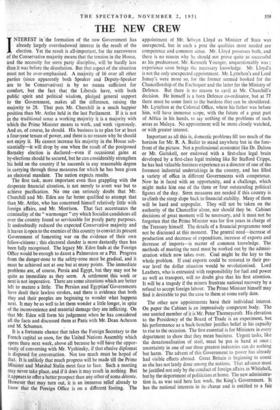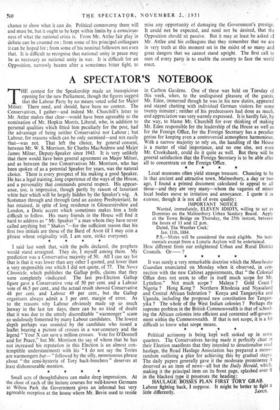THE NEW CREW
INTEREST itithe formation of the new Government has already largely overshadowed interest in the result of the election. Yet the result is all-important, for the narrowness of the Conservative majority means that the tension in the House, and the necessity for stern party discipline, will be hardly less than it was before the dissolution. But that aspect of the situation must not be over-emphasised. A majority of 16 over all other parties (since apparently both Speaker and Deputy-Speaker are to be Conservatives) is by no means sufficient for comfort, but the fact that the Liberals have, with both public spirit and political Wisdom, pledged general support to the Government, makes all the difference, raising the majority to 28. That puts Mr. Churchill in a much happier position than Mr. Attlee held in the last Parliament. If it is not in the traditional sense a working majority it is a majority with which the Prime Minister means to work, and work vigorously. And so, of course, he should. His business is to plan for at least a four-year tenure of power, and there is no reason why he should not enjoy it. He cannot increase his majority in the House sub- stantially—k will drop by one when the result of the postponed Barnsley election is declared—even if occasional gains at by-elections should be secured, but he can considerably strengthen his hold on the country if he succeeds in any reasonable degree in carrying through those measures for which he has been given an electoral mandate. The nation expects results.
The first task, more important even than grappling with the desperate financial situation, is not merely to avert war but to achieve pacification. No one can seriously doubt that Mr. Churchill and Mr. Eden are far better qualified to attempt that than Mr. Attlee, who has concerned himself relatively little with foreign affairs, and Mr. Morrison. That fact accentuates the criminality of the " warmonger " cry which Socialist candidates all over the country found so serviceable for purely party purposes. It undoubtedly reduced the expected Conservative majority and it leaves it open to the enemies of this country to convict its present Government of fomenting war on the evidence of their own fellow-citizens ; this electoral slander is more dastardly than has been fully recognised. The legacy Mr. Eden finds at the Foreign Office would be enough to daunt a Palmerston or a Pitt. Progress from the danger-zone to the safety-zone must be gradual, and it must be achieved not at one but at many points. The immediate problems are, of course, Persia and Egypt, but they may not be quite as immediate as they seem. A settlement this week or next is not imperative. There are some situations which are better left to mature a little. The Persian and Egyptian*Govemments have dealt their lawless strokes, and there is evidence that both they and their peoples are beginning to wonder what happens next. It may be as well to let them wonder a little longer, in spite of the inconvenience and material damage they are inflicting. On that Mr. Eden will form his judgement when he has considered all the facts and discussed them at Paris with Mr. Dean Acheson and M. Schuman.
It is a fortunate chance that takes the Foreign Secretary to the French -capital so soon, for the United Nations Assembly which opens there next week, above all because he will have the oppor- tunity of conversing with Mr. Vyshinsky, if that elusive diplomat is disposed for.conversation. Not too much must be hoped of that. It is unlikely that much progress will be made till the Prime Minister and Marshal Stalin meet face to face. Such a meeting may never take place, and if it does it may result in nothing. But it appears to offer a better prospect than any other of some detente. However that may turn out, it is an immense relief already to know that the Foreign Office is on a different footing. The appointment of Mr. Selwyn Lloyd as Minister of State was unexpected, but in such a post the qualities most needed are competence and common sense. Mr. Lloyd possesses both, and there is no reason why he should not prove quite as successful as his predecessor, Mr. Kenneth Younger, unquestionably was ; experience soon brings the necessary knowledge. Mr. Lloyd's is not the only unexpected appointment. Mr. Lyttelton's and Lord Ismay's were more so, for the former seemed booked for the Chancellorship of the Exchequer and the latter for the Ministry of Defence. But there is no reason to cavil at Mr. Churchill's decision. He himself is a born Defence co-ordinator, but at 77 there must be some limit to the burdens that can be shouldered. Mr. Lyttelton at the Colonial Office, where his father was before him, will have immense scope, with the future of a great part of Africa in his hands, to say nothing of the problems of such areas as Malaya. No appointment will be more closely watched, or with greater interest.
Important as all this is, domestic problems fill too much of the horizon for Mr. R. A. Butler to stand anywhere but in the fore- front of the picture. Not a professional economist like Dr. Dalton or Mr. Gaitskell, nor endowed .with a first-class legal brain developed by a first-class legal training like Sir Stafford Cripps, he has had valuable business experience as a director of one of the foremost industrial undertakings in the country, and has filled a variety of office in different Governthents with competence. Now he is faced with an opportunity, and a challenge, which might make him one of the three or four outstanding political figures of the day. Stern measures are needed if this country is to climb the steep slope back to financial stability. Many of them will be hard and unpopular. They 'will not be taken on the authority of the Chancellor alone, nor should they be: Cabinet decisions of great moment will be necessary, and it must not be forgotten that the Prime Minister was for five years in charge of the Treasury himself. The details of a financial programme need not be discussed at this moment. The general need—increase of production and decrease of expenditure, increase of exports and decrease of imports—is matter of common knowledge. The methods of meeting the need must be worked out by the admini- stration which now takes over. Coal might be the key to the whole problem. If coal exports could be restored to their pre- war level the dollar situation would be revolutionised. Lord Leathers, who is entrusted with responsibility for fuel and power as well as transport, will no doubt give that his first attention. It will be a tragedy if the miners frustrate national recovery by a refusal to accept foreign labour. The Prime Minister himself may find it desirable to put the case to them at some early date.
The other new appointments have their individual interest. On paper the Cabinet is an impressively competent body. The one untried member of it is Mr. Peter Thomeycroft. His elevation to the Presidency of the Board of Trade is an experiment, but his performance as a back-bencher justifies belief in his capacity to rise to the occasion. The first essential is for Ministers in every department to show that they mean business. Urgent tasks, like the denationalisation of steel, must be put in hand at once : uncertainty in one of our three greatest industries can do nothing but harm. The advent of this Government to power has already had visible effects abroad. Great Britain is beginning to count as she has not lately done among the nations. That advance must be justified not only by the conduct of foreign affairs in Whitehall, but by the deportment of politicians at home. The new administra- tion is, as was said here last week, the King's Government It has the national interests in its charge and is entitled to a fair chance to show what it can do. Political controversy there will and must be, but it ought to be kept within limits by a conscious- ness of what the national crisis is. From Mr. Attlee fair play in debate can be counted on ; from some of his principal colleagues it can be hoped for ; from some of his nominal followers not even that. It is difficult to recognise that national unity in peace may be as necessary as national unity in war. It is difficult for an ,Opposition, narrowly beaten after a sometimes bitter fight, to miss any opportunity of damaging the Government's prestige. It could not be expected, and need not be desired, that the Opposition should sit passive. But it may at least be asked of Mr. Attlee and his colleagues that they remember that we are in very truth at this-moment set in the midst of so many and great dangers that we cannot stand upright. The first call to men of every party is to enable the country to face the world erect.



































 Previous page
Previous page